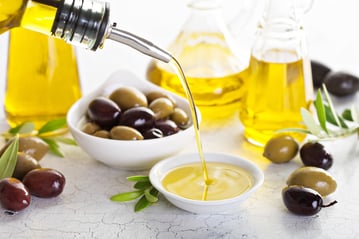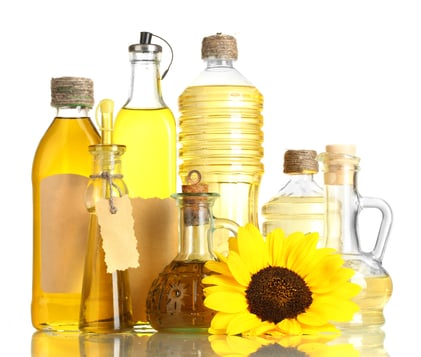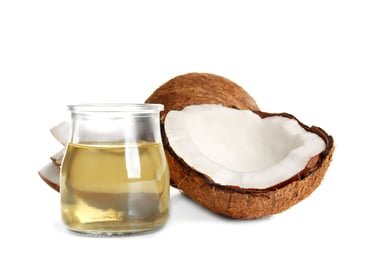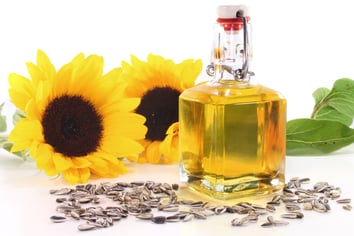Shopping for cooking oils can seem overwhelming with the variety of ones to choose from. Each has its own benefits, flavors, and cooking properties. With more oils coming to market, we’ll break down what to know, our recommendations and things to consider. You might be surprised to find that what you think is the healthiest oil may actually lose its benefits once you expose it to heat.
When it comes to using oils, the goal is to use the least amount of non-inflammatory fat to give food great taste. The healthiest oil to use is Extra Virgin Olive Oil because it is rich in non-inflammatory monounsaturated fat and polyphenols.
Guide to Cooking Oils
Oils aren’t much different in terms of the amount of fat and calories they provide with most clocking in around 4.5 grams of fat and 40 calories per teaspoon. Where the difference arises is in the amounts of monounsaturated, polyunsaturated and saturated fats and their smoke point, the temperature at which an oil begins to burn or smoke.
Extra Virgin Olive Oil: Best for dressings.

Extra Virgin Olive Oil (EVOO) is primarily a monounsaturated fat rich in polyphenols, most specifically hydroxytyrosol.
Considerations:
- We suggest limiting this superior oil as a cooking oil since the high heat will degrade the remarkable health benefits of the polyphenols. Instead use the least amount of oil you can during the cooking process so that you can add more Zone Organic Extra Virgin Olive Oil to the finished meal.
- An alternative (and cheaper) choice for cooking is the use of refined (or light) olive oil. All the polyphenols have been removed from this type of olive oil, but it is relatively inexpensive, and readily available in most supermarkets. It does have a lower smoke point (320-405°F) than other oils so you want to keep that in mind pending the degree of heat.
- A good proportion of the extra virgin olive oil market in the U.S. is adulterated with cheaper cooking oils. This adulteration decreases the levels of both the monounsaturated fats and polyphenols. Our Recommendation: Zone Organic Extra-Virgin Olive Oil, which we import from a certified organic cooperative in Umbria, Italy. It meets our exact requirements for polyphenols. Then we re-certify its polyphenol content before it is sold to consumers.
Clinical Benefits of Olive Oil:
- EVOO is a central component to the Mediterranean diet which has been linked to longevity and a lower incidence of chronic disease1.
- Daily use has recently been associated with an improved metabolic and inflammatory profile in overweight individuals with Type II diabetes2.
- In a recent article, it was demonstrated that EVOO protects a mouse model that develops early Alzheimer’s disease from cognitive decline3.
Corn, Soy, Safflower, Sunflower Oil and Canola Oil: Avoid if possible.

Standard cooking oils that you find on the supermarket shelves such as corn, soy, safflower, and sunflower oil tend to be rich in omega-6 fats.
Considerations:
- These oils may be inexpensive to purchase but are easily oxidized by high heat to generate free radicals which can be detrimental to our health.
- The remaining oil that’s not oxidized supplies high levels of omega-6 fats which act as the starting materials to be transformed into powerful inflammatory hormones that drive inflammation.
- Canola oil has lower amounts of omega-6 fatty acids, but still double (approximately 21%) the amount found in olive oil.
Palm and Coconut Oil: Avoid if possible
These oils have been gaining popularity, but they are rich in saturated fats which has negative consequences for our health.
Considerations:
- Oils rich in saturated fat may be more heat resistant than oils rich in omega-6 fats, but they contain some level of palmitic acid.
- Higher levels of palmitic acid in any cooking oil result in greater levels of inflammation because palmitic acid is the most inflammatory of all saturated fats. This heightened inflammation is especially true for the brain.
- Palm oil has the highest levels of palmitic acid, but butter, lard, and bacon fat aren’t too far behind.
- Coconut oil has lower levels of palmitic acid, but its short chain fatty acids rapidly deplete the liver of all of its glycogen stores making it difficult to maintain stable blood sugar levels.
High-oleic Oils (Safflower and Sunflower): Best for cooking.

High-oleic oils are becoming more popular commercially due to their high concentration of monounsaturated fats (82-90% oleic acid)4.
Considerations:
- High- oleic oils are genetic variations of the standard (and cheaper) sunflower and safflower oils
- These are the best fats for cooking because of their ability to withstand higher temps and their lower amounts of saturated fat
- They are bred to be very rich in monounsaturated fats and are very resistant to the oxidative damage caused by high heat.
- For those concerned about genetically modified organisms (GMO), high-oleic sunflower oil is an attractive cooking oil since its non-GMO in addition to being high in vitamin E.
Summary
The key to wellness is to have great tasting food while keeping your hormones in check to reduce diet-induced inflammation. When it comes to the oils in your diet your best bet is always using the least of amount of cooking oil (ideally still high in monounsaturated fats) so after the food has cooled down you can add some additional Zone Organic Extra Virgin Olive Oil to give it extraordinary taste with a high dose of polyphenols.
References:
- Tejada S, Pinya S, Del Mar Bibiloni M, Tur JA, Pons A, Sureda A. Cardioprotective effects of the polyphenol hydroxytyrosol from olive oil. Curr Drug Targets. 2016 Oct 5
- Santangelo C, Filesi C, Varì R, Scazzocchio B, Filardi T, Fogliano V, D'Archivio M, Giovannini C, Lenzi A, Morano S, Masella R. Consumption of extra-virgin olive oil rich in phenolic compounds improves metabolic control in patients with type 2 diabetes mellitus: a possible involvement of reduced levels of circulating visfatin. J Endocrinol Invest. 2016 Nov;39(11):1295-1301. Epub 2016 Jun 25.
- Lauretti E et al. “Extra virgin olive oil ameliorates cognition and neuropathology of the 3xTg mice.” Ann Clin Trans Neurology 2017 doi: 10.1002/acn3:341
- Adams, Jill. Oil Technology in Food Product Development. Demonization of oils and fats has retreated, but lipid technology is still going strong. Prepared Foods Magazine May 2016: 74-86. Print.







Let Us Know What You Thought about this Post.
Put your Comment Below.